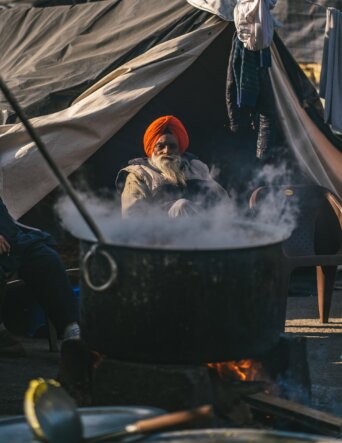- About
- Topics
- Picks
- Audio
- Story
- In-Depth
- Opinion
- News
- Donate
-
Signup for our newsletterOur Editors' Best Picks.Send
Read, Debate: Engage.

| topic: | Food Security |
|---|---|
| located: | India |
| editor: | Tish Sanghera |
In the economic aftermath of the COVID-19 pandemic, India has dropped seven places to 101st on this year’s Global Hunger Index.
The index, which tracks health indicators such as undernourishment and stunting, shows that India has experienced a remarkable decline in the health of its population. In 2015, the country was in 55th place but now finds itself only a few places ahead of Yemen and Somalia, and behind its neighbours Pakistan, Nepal and Bangladesh.
Perhaps more worrying than the disturbing increase of malnourished children in the country is the denigrating way in which India’s government has responded to the findings. The BJP-led government labelled the index “unscientific” and “devoid of ground reality.” It dismissed the index’s methodology, claiming it was based on an opinion poll.
Welthungerhilfe, a German nonprofit and the producer of the hunger index, have been clear in its response. “The Global Hunger Index is peer-reviewed by external experts. The methodology has long been established and tested,” it defended. “The international community - including India - has agreed upon the Sustainable Development Goals (SDG) and the [Global Hunger Index] uses indicators that are part of the internationally recognised set to measure progress toward the SDGs.”
India’s response is in no way surprising. It has become somewhat routine in Prime Minister Modi’s government to slander any global index which records India’s poor performance and portrays his governance in a negative light. Last year for example, India fell to 142nd out of 180 countries in the World Press Freedom Index. The then Minister for Information and Broadcasting, Prakash Javadekar, responded by vowing to “expose” surveys that portray a “bad picture about ‘Freedom of Press’ in India.”
To criticise these rankings and the organisations that compile them deflects attention from the hardships affecting real people every day. When the COVID-19 pandemic peaked, the images of millions of migrants walking down highways to reach their homes were beamed across TV screens globally and posted on social media networks. Though efforts were made to send free ration kits to this section of the population, the government also convened ministers and a selective group of friendly journalists to discuss how to handle the flood of criticism. It wanted to draft strategies to monitor “negative influencers” who discredited the government. Currently, the Indian government's data portrays hunger as a declining trend.
Hunger is not only about empty stomachs; a malnourished population means a systemic weakening of a country’s main asset: it’s human capital. Indeed, studies show that a child’s diet during the first 1000 days of development is crucial for sound brain development and can determine future life outcomes.
All of these consequences are only exacerbated by the government’s unwillingness to engage with the facts and its unhinged desire to control and warp the narrative.
Photo by Rupinder Singh
